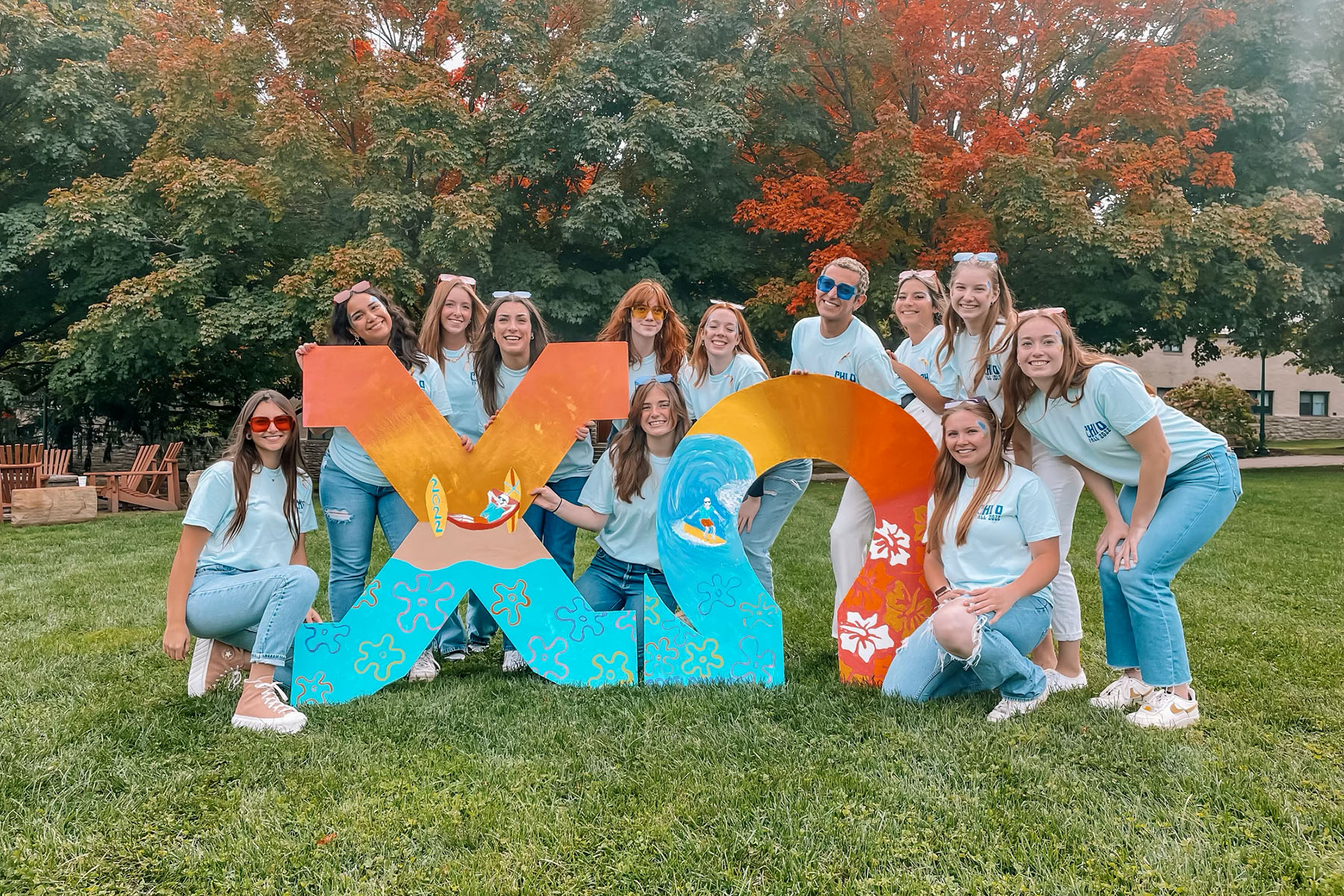We’re telling the untold stories of women, women of color and LGBTQ+ people. Sign up for our daily newsletter.
Chi Omega sisters across the country say they want more expansive guidelines around who can be a part of their organization, after The 19th published a piece about a nonbinary person being kicked out of their sorority.
On June 2, Fabián “Fa” Guzmán had their sorority membership voided, with no chance for appeal. Guzmán, 22, had accepted a bid with Chi Omega in the fall of 2022 after St. Lawrence University received permission from the national organization to allow Guzmán to rush as a nonbinary student. Guzmán was the first nonbinary individual to go through rush at the small liberal arts college in upstate New York. Then, 10 months later, they were told their membership was being voided because they do not exclusively identify as a woman and because of their sex assigned at birth.
Chi Omega’s public written membership policy states that “membership selection criteria shall include females and individuals identifying as women of diverse racial, religious, and ethnic backgrounds.” There is no publicly available documentation that states that a person’s sex assigned at birth is a necessary condition for accepting nonbinary members, a qualification that The 19th has been told exists not only by multiple current and past Chi Omegas, but confirmed through an audio recording of the meeting where Guzmán’s membership was voided.
-
Previous Coverage:
Guzmán has launched a petition asking for Chi Omega’s national office to reinstate their membership. In three days, the petition garnered over 600 signatures. Both in the comments of the petition and on social media, Guzmán has received an overwhelming show of support from current Chi Omegas and alums of the organization.
Chi Omegas past and present spoke to The 19th about what the future of the organization — and the Greek system — should look like.
Olivia Rhee, 21, only just learned about Guzmán’s situation, but the question of how gender identity factors into membership has been on her radar since 2020.
Rhee, a rising senior at the University of California, Berkeley, went through sorority rush when she began college and ultimately pledged at Chi Omega. In the spring of 2021, she was appointed as her chapter’s diversity, equity and inclusion (DEI) chair, a position she held through December 2022.
When Rhee began as DEI chair, she immediately had questions about how gender identity fit into her work. At the time, trans women were not permitted to rush and pledge Chi Omega. When the national organization announced in 2022 that it changed bylaws to allowed trans women to rush, Rhee was excited — and immediately began to wonder what sorts of policies there would be around accepting nonbinary members.
Without clear national guidance on the issue, Rhee said that during her time as DEI chair, her chapter made an effort to make all pronouns in their own chapter bylaws gender-neutral and to remove language explicitly calling Chi Omega a “women’s organization.”
“I really wanted it to be a safe environment and a safe space for nonbinary members and for members of all expansive gender identities,” Rhee told The 19th.
But I think that as we’re going forward, we’re realizing that gender is much more complex than it’s been viewed in the past.
Olivia Rhee
Making this a reality wasn’t always simple, though, because of the fact that Chi Omega was still qualified as a “women’s organization,” Rhee said, which meant there was only so much they could publicly do under national guidelines.
“But I think that as we’re going forward, we’re realizing that gender is much more complex than it’s been viewed in the past. I think many of us as college students are continuing to learn how to understand ourselves and our identities and the identities of other people.”
Because of this, she said that looking ahead, she hopes Chi Omega — an organization she loves and values dearly — will “create substantive reforms in terms of implementing gender-inclusive policies.”
While she understands why sororities can get a “bad reputation,” especially when it comes to topics involving DEI, she said her time as a Chi Omega sister who is also a queer, Asian woman has led her to be “relieved and surprised” to find she wasn’t alone in loving the organization and also wanting larger, systemic change to the institution itself.
Another Chi Omega member who is currently the DEI chair of a chapter at a public university in the Midwest asked to remain anonymous, for fear that their membership would be revoked for speaking to the press about the organization. She told The 19th that they are in a group chat with Chi Omega DEI chairs nationwide, which is currently overtaken with conversation about what happened to Guzmán. She said that overwhelmingly, most people in the chat want to see an official bylaws change from the Chi Omega national office, allowing for nonbinary people to hold membership, regardless of their sex assigned at birth.
She said that when she first became DEI chair at her chapter, one of the first things she did was ask her chapter’s national consultant on the national policy on allowing trans and nonbinary members at Chi Omega. She identifies as pansexual, and wanted to ensure that her chapter was fully inclusive of all LGBTQ+ identities.
This DEI chair said the answer she was given just last year was the same thing Guzmán was told by Chi Omega when their membership was voided — but that appears in writing nowhere in the organization’s official membership guidelines — that nonbinary members are allowed only if their sex assigned at birth is female. She describes this policy as “weirdly specific and needing details that you shouldn’t need” to decide someone’s membership qualifications.
“How do you even go about asking that? I asked, how do you do that to someone you obviously don’t even know that well and then are supposed to say, ‘Hey you want to join our organization? Could you first tell me everything about your life before you came out as nonbinary?’ It is such an intimate detail. It feels like a boundary that shouldn’t be crossed.”
She said that she has heard discussion within her own chapter about how while what happened to Guzmán was unquestionably unfair, the chapter feels it is “going to now start following our rules so closely” for fear of some kind of retaliatory measure by the national office. What happened to Guzmán feels like nothing short of a cautionary tale and sobering warning about pushing back on the more traditional values of the national organization.
She said that looking ahead, she hopes that whether someone is nonbinary or gender fluid, “if you’re passionate about what you’re signing up for,” you should be eligible for membership. She said she would like to see an organization-wide rule in place affirming this kind of position, and not ever leaving things up to individual chapters that can then later be disputed by the national office.
Sidney Hollingsworth, 30, is a graduate of Southern Methodist University (SMU) in Dallas. She rushed as early as she could — the spring of her freshman year — and knew from day one she only ever wanted to be a Chi O. The people she met during her first semester of college who she most admired were all in Chi Omega, she said, and she was also aware that it is the biggest sorority in the country, with the largest alumni network for support and future networking. The group had the highest average GPA of any Greek house on campus and the highest percentage of students involved in campus life — she knew it was where she had to be. It was the only sorority she rushed, and remained an involved member until she graduated in 2015, at which point she gained alumna status in the organization. She was even selected to participate in a leadership training program at Chi Omega’s national headquarters as an alumna.
Just last week she learned about what had happened to Guzmán through The 19th’s Instagram post. “I am ashamed that I’m not surprised by headquarters,” she said.
Thinking back on her own experiences with Chi O, she thinks about sisters from her time there who have come out as queer since graduating from college. She wonders now how much they hid their sexual identities while in college because of fear of acceptance by their peers, including within Chi Omega. “I really wish that I would have done more in college. I definitely feel like what if I and others had been more explicit in our support, and that we would have celebrated their queerness and who they were then.”
Hollingsworth said she hopes that first and foremost, Guzmán will have their membership reinstated immediately and for an official bylaws change to happen at next summer’s national convention.
She said she feels that idea of barring gender nonbinary students unless they are also assigned female at birth does not only “a harmful and hurtful disservice to [nonbinary potential members], but it does a disservice to all Chi Omega members” by promoting an environment of exclusion and discrimination. “I see Chi Omega as an organization being founded out of the reality of gender discrimination now shooting itself in the foot when it comes to that. Do you really want to limit our membership by denying support to those who desire it?”
She points out that technically, Chi Omega calls itself a fraternity and not a sorority — and was founded with the intention of creating a space for women under the umbrella label of a space whose name implied that only men belong. It’s why she thinks that Chi Omega should continue to evolve to be an organization that is a space for “all gender identities that are underrepresented in systems of power.”
“The founding members were essentially not gender conforming in terms of their gender identity relative to their times. Being female hurt their place in the world — they were expected to be childbearing and at home, not in college and not in fraternities,” she said. It’s why she thinks that allowing for nonbinary members is in fact exactly what the founders would have wanted.
Katie Buck was in Chi Omega and graduated from St. Lawrence — the same school as Guzmán — in 2020. She said that Guzmán’s story goes against everything she believed to be true of her sorority and its values. “Chi Omega is a wonderful community that chooses their sisters based on six principles. EK Chapter saw these in Fa and continues to accept those that embody friendship, high standard of personnel, sincere learning and credible scholarship, participate in campus activities, career development, and community service.”
Kelly Cushing, 20, is a current student at St. Lawrence and a member of Chi Omega there. Seeing what has happened with Guzmán has made her reflect deeply on the very purpose of sororities — and informed her thinking about their future.
If people who refuse to change continue to be the ones who regulate what goes on in a sorority, then sororities are just going to be stuck in the past.
Kelly Cushing
Cushing said that she thinks each chapter should be able to decide for themselves who they get to admit. “If a chapter says communally as a group that this person completely exemplifies and meets all of the standards that a Chi Omega or whatever sorority is supposed to uphold, then I feel as though the chapter knows better than nationals….If people who refuse to change continue to be the ones who regulate what goes on in a sorority, then sororities are just going to be stuck in the past.”
Cushing is against any kind of national policy that asks for confirmation of a person’s sex assigned at birth as a qualification for membership. “I don’t believe that’s fair at all and quite frankly, it’s also nobody’s business.”
In the meantime, she says she thinks there is a lot of “re-education” on gender identity, and the differences between sex and gender, that needs to happen among the older generations who comprise national leadership at Greek organizations from the younger generation who comprise its current dues-paying membership.
Cushing concluded, “People talk about wanting change and wanting to move on from being a bigoted society, but you can’t do that if you continue to just enable exclusionary practices.”







